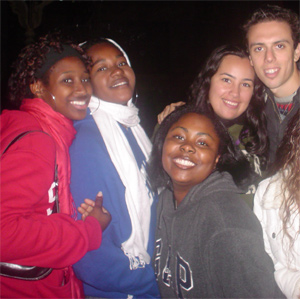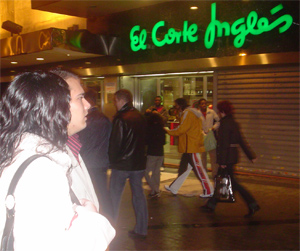TABLE
OF CONTENTS
|
Migration and Me
By Carmina Osuna
Through my experiences while
living in the self-contained armosphere of the ship, I’ve observed the
many
differences that exist even among Americans. In our particular
voyage
there were no black staff and only 6 black students. There were
less than
fifty Latin American Hispanic students, myself included. In our
migration
class we had a couple of adult passengers who sat in on our lectures
and
discussions. One in particular shared the classic idealist view
of most
of the Caucasian elite people in America. He believes
the five basic myths about immigration that Douglas S. Massey points
out in his article "Five Myths About Immigration: Common
Misconceptions Underlying U.S.
Border-Enforcement Policy" to be true. The myths about
migration include: "migration is caused by the lack of economic
development in migrant’s home countries,” “ by population growth in the
migrant's home,” “response to difference in wages,” “migrants are
attracted to
the United States by generous public benefits,” and that “most
immigrants
intend to settle permanently in the U.S.” (p. 1). In the migration
course we
looked at these myths and compared them to text from the different
countries we
visited which proved the myths to be just that, fiction. 
A common misconception is that migrants are
given all of the socioeconomic privileges that
the U.S
provides, like welfare. Another misconception shared by the
majority of U.S. citizens is that the
illegal immigrants take advantage of the programs funded by the U.S. taxpayer’s money.
The truth, however, is that most workers obtain an illegal social
security
number and he or she pay taxes like any normal American. The
disadvantages are then the fear of getting caught which prohibits their
use of
any form of governmental help, and the money that is supposed to be put
away for
social security can never be claimed. Many of the facts mentioned
above
are overshadowed by the above-mentioned misconceptions, thus leaving a
great deal of
discrimination and hatred towards the undocumented and the ethnic
minorities.
Before Semester At Sea, I thought that the U.S. was the only place
with discrimination of this sort, however the experiences I've had
while
traveling have proven me wrong. Stephen Castles and Mark Miller,
in The
Age of Migration, write:
This
conflict with the reality of nation-state formation, however, in which
being a
citizen depends on the membership in a certain national community,
usually
based on the dominant ethnic group of the territory concerned….. it is
possible
to keep relatively small groups in situations of permanent subjugation
and
exclusion from the imagined community
(42)
When reflecting on the Filipinas
in Hong Kong and the Africans
in Spain
I
discovered more similarities than I expected. There were some
differences
as well. In Spain the immigrants learn
Spanish, because that is the native language of the land. In Hong Kong, one of the capitals of transnational
business, English is the language the Filipinas learn before the native
language of Cantonese. It could be said that to learn the
language of a
country in which one is working is a way of adapting and blending in or
it's
the way to survive i.e. make money. For migrants to learn the
money
making language is the only means of survival for them and their
families back
home. Yet despite separation from their land both groups
similarly
remained closesly knit.
 Although it
didn’t make sense to me at the beginning of the voyage, it’s now
obvious that to stay sane in a country that doesn’t
accept you,
not because of personal identity but because of outward appearance, is
to stay
close to those who can appreciate and understand one's origin. Similarly, in Bosnia,
the Muslims trade houses with the Serbs so that they may move into an
established Muslim community, where it is easier to live with
familiarity. What does taking over public
spaces in groups really mean? Is it just because the immigrants
feel
safety in numbers, or is there also a political side to it? In
Lisa
Law’s
article "Defying Disappearance: Cosmopolitan public spaces in Hong Kong," she states that the space invaded by the
Filipinas in central Hong Kong is not just a home away from home,
where
“thousands of domestic workers cast off the cultural conventions of
their
Chinese employers for one day a week and eat Filipino food, read
Filipino
newspapers and magazines.” (11) Rather, Law believes that it also
raises
questions
about the "political efficacy of conceiving this space as a cultural
landscape.”
(16) After
experiencing Statue Square
in Hong Kong and El Corte Ingles in Spain,
I have to agree with Lisa Law. Although
the Africans I saw were not necessarily casting off the Spanish
cultural
conventions, they were definitely standing their ground and making a
space
and a living for themselves. Although it
didn’t make sense to me at the beginning of the voyage, it’s now
obvious that to stay sane in a country that doesn’t
accept you,
not because of personal identity but because of outward appearance, is
to stay
close to those who can appreciate and understand one's origin. Similarly, in Bosnia,
the Muslims trade houses with the Serbs so that they may move into an
established Muslim community, where it is easier to live with
familiarity. What does taking over public
spaces in groups really mean? Is it just because the immigrants
feel
safety in numbers, or is there also a political side to it? In
Lisa
Law’s
article "Defying Disappearance: Cosmopolitan public spaces in Hong Kong," she states that the space invaded by the
Filipinas in central Hong Kong is not just a home away from home,
where
“thousands of domestic workers cast off the cultural conventions of
their
Chinese employers for one day a week and eat Filipino food, read
Filipino
newspapers and magazines.” (11) Rather, Law believes that it also
raises
questions
about the "political efficacy of conceiving this space as a cultural
landscape.”
(16) After
experiencing Statue Square
in Hong Kong and El Corte Ingles in Spain,
I have to agree with Lisa Law. Although
the Africans I saw were not necessarily casting off the Spanish
cultural
conventions, they were definitely standing their ground and making a
space
and a living for themselves.
After
coming
back onto the ship, I
couldn’t help but ask myself why must it come down to feeling
uncomfortable in
an educational setting where the homosexuals and the minorities are
valued less
than any other Caucasian student? To
many Semester at Sea students this voyage was a voyage of discovery in
which
they experienced being followed in a store for the first time, or being
looked
at as if they don’t belong for the first time. The
truth is that for many Africans in Spain,
Filipinas in Hong Kong, and ethnic minorities
in America
this is part of their daily lives. To me,
this voyage opened my eyes to the realization that discrimination is
everywhere
because the dominant ethnic group will always be a step above everyone
else. Although
most students will finish this semester never realizing how the world
is not as
blissful as their lives I am glad for the few that will go back home
and think
about how vital migrants are to the world.
|


 Although it
didn’t make sense to me at the beginning of the voyage, it’s now
obvious that to stay sane in a country that doesn’t
accept you,
not because of personal identity but because of outward appearance, is
to stay
close to those who can appreciate and understand one's origin. Similarly, in
Although it
didn’t make sense to me at the beginning of the voyage, it’s now
obvious that to stay sane in a country that doesn’t
accept you,
not because of personal identity but because of outward appearance, is
to stay
close to those who can appreciate and understand one's origin. Similarly, in